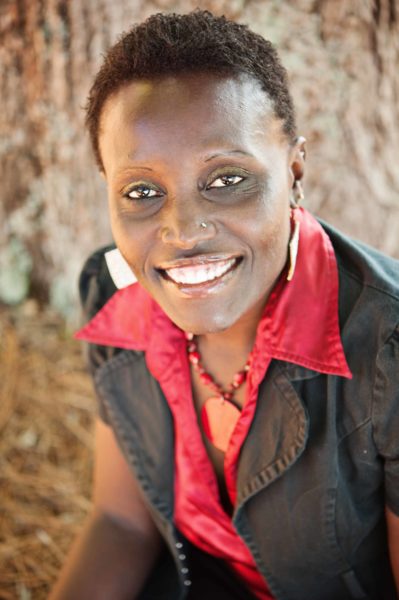
by J. K. Wenderott
The first thing I notice about Dr. Esther Ngumbi when she joins our Zoom room for her interview are her earrings: vibrant sunflowers. “I bought them on Etsy,” she says smiling. Dr. Ngumbi, an assistant professor of Entomology and African American Studies at the University of Illinois Urbana-Champaign (UIUC), radiates joy and excitement as we discuss her career path and passions that stem from her experiences growing up in a rural farming community along the Kenyan Coast. Describing her journey that has led her to study and research insects, ecology, food (in)security, and sustainability, Ngumbi says, “The more I learned, the more I wanted to learn. It was this treadmill that kept me going.”
Ngumbi attended Kenyatta University in Nairobi, Kenya, for her Bachelor’s and Master’s degrees of Science. She then completed her PhD in Entomology from Auburn University, becoming the first woman from her hometown to obtain a PhD degree. Describing herself as a young girl growing up in Kenya, Ngumbi says, “I could not imagine a career in science, because I did not know what science was all about.” She had role models that were teachers, doctors, and accountants, and so she originally thought she would be an accountant when she grew up. The results of her secondary school exams, though, pointed her in a different direction: “Science chose me.” Once she started to do experiments in the lab, she was hooked. “I became very, very curious… I wanted to spend more time in the lab, and I was enjoying every moment.” Ngumbi recalls some early practicals with insects in the laboratory, as well as the proximity of the International Centre of Insect Physiology and Ecology to her University, that laid the foundation for her interests and future research in entomology.
At UIUC, Ngumbi’s research focuses on the challenges agriculture faces to bring food to the table, brought about by stressors like climate change and insect outbreaks. How are plants defending themselves? How are plants recruiting the help they need? How can we manipulate crops to ensure they are defending themselves? These are key questions that Ngumbi is investigating. Her motivation to pursue these studies comes, in part, from formative experiences as a young girl watching farmers in her community struggle with insects and persistent drought destroying crops. These forces that led to food insecurity in her community and across the globe are ones that Ngumbi is also seeking to understand more. As an assistant professor with appointments in both Entomology and African American Studies, Ngumbi straddles the social and natural sciences. In African American Studies, she teaches classes related to food (in)security. Ngumbi feels her work in both departments influences each other, and she notes the important work of connecting her research in the lab to the impact it has on people, especially people of color in the US and across the globe.
Ngumbi stresses the critical importance of mentoring throughout her life: “I am a product of mentors who held my hand when I did not know anything about entomology and science.” These mentors range from her teachers that believed in her scientific abilities to her research supervisors that helped her see how experimental results tell a story to her current colleagues and department chair that are helping her navigate the tenure process. Having seen the impact of mentoring on her life, Ngumbi is passionate about giving back. She serves as a mentor for her graduate students and through entities like the Clinton Global University Initiative and President Barack Obama’s Young Leadership Program: “As women [in science], we are few in numbers and we cannot afford to have anyone that wants to be in science walk away because they lacked a mentor.” Ngumbi is also dedicated to being a role model that she did not have for young girls in her community and inspiring more young girls to see themselves as scientists.
When asked what advice Ngumbi would give to her younger self, she says, “Do not edit any of your aspirations and dreams… Be you and do not silence yourself.” As we wind down our interview, I cannot help but again notice the vibrant sunflower earrings as Dr. Ngumbi shares a final piece of wisdom: “Allow yourself to bloom where you are planted.” If you’d like to learn more about Ngumbi and her work, please visit https://www.estherngumbi.com/ or https://sib.illinois.edu/profile/enn.
